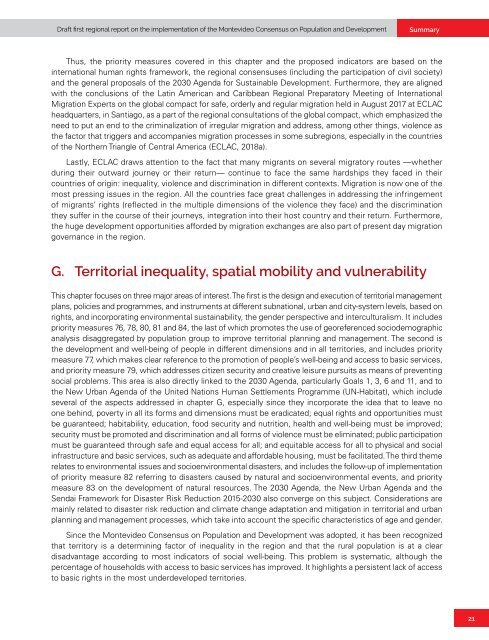Draft first regional report on the implementation of the Montevideo Consensus on Population and Development
This draft report seeks to give an account of progress in the implementation of the priority measures of the Montevideo Consensus on Population and Development in the region, as well as the differences between countries in terms of the degree of implementation. By highlighting relevant national experiences, it also seeks to facilitate the exchange of good practices among countries so that they can benefit from each other in their efforts to advance the implementation of the actions of the Montevideo Consensus.
This draft report seeks to give an account of progress in the implementation of the priority measures of the Montevideo Consensus on Population and Development in the region, as well as the differences between countries in terms of the degree of implementation. By highlighting relevant national experiences, it also seeks to facilitate the exchange of good practices among countries so that they can benefit from each other in their efforts to advance the implementation of the actions of the Montevideo Consensus.
You also want an ePaper? Increase the reach of your titles
YUMPU automatically turns print PDFs into web optimized ePapers that Google loves.
<str<strong>on</strong>g>Draft</str<strong>on</strong>g> <str<strong>on</strong>g>first</str<strong>on</strong>g> <str<strong>on</strong>g>regi<strong>on</strong>al</str<strong>on</strong>g> <str<strong>on</strong>g>report</str<strong>on</strong>g> <strong>on</strong> <strong>the</strong> implementati<strong>on</strong> <strong>of</strong> <strong>the</strong> M<strong>on</strong>tevideo C<strong>on</strong>sensus <strong>on</strong> Populati<strong>on</strong> <strong>and</strong> <strong>Development</strong><br />
Summary<br />
Thus, <strong>the</strong> priority measures covered in this chapter <strong>and</strong> <strong>the</strong> proposed indicators are based <strong>on</strong> <strong>the</strong><br />
internati<strong>on</strong>al human rights framework, <strong>the</strong> <str<strong>on</strong>g>regi<strong>on</strong>al</str<strong>on</strong>g> c<strong>on</strong>sensuses (including <strong>the</strong> participati<strong>on</strong> <strong>of</strong> civil society)<br />
<strong>and</strong> <strong>the</strong> general proposals <strong>of</strong> <strong>the</strong> 2030 Agenda for Sustainable <strong>Development</strong>. Fur<strong>the</strong>rmore, <strong>the</strong>y are aligned<br />
with <strong>the</strong> c<strong>on</strong>clusi<strong>on</strong>s <strong>of</strong> <strong>the</strong> Latin American <strong>and</strong> Caribbean Regi<strong>on</strong>al Preparatory Meeting <strong>of</strong> Internati<strong>on</strong>al<br />
Migrati<strong>on</strong> Experts <strong>on</strong> <strong>the</strong> global compact for safe, orderly <strong>and</strong> regular migrati<strong>on</strong> held in August 2017 at ECLAC<br />
headquarters, in Santiago, as a part <strong>of</strong> <strong>the</strong> <str<strong>on</strong>g>regi<strong>on</strong>al</str<strong>on</strong>g> c<strong>on</strong>sultati<strong>on</strong>s <strong>of</strong> <strong>the</strong> global compact, which emphasized <strong>the</strong><br />
need to put an end to <strong>the</strong> criminalizati<strong>on</strong> <strong>of</strong> irregular migrati<strong>on</strong> <strong>and</strong> address, am<strong>on</strong>g o<strong>the</strong>r things, violence as<br />
<strong>the</strong> factor that triggers <strong>and</strong> accompanies migrati<strong>on</strong> processes in some subregi<strong>on</strong>s, especially in <strong>the</strong> countries<br />
<strong>of</strong> <strong>the</strong> Nor<strong>the</strong>rn Triangle <strong>of</strong> Central America (ECLAC, 2018a).<br />
Lastly, ECLAC draws attenti<strong>on</strong> to <strong>the</strong> fact that many migrants <strong>on</strong> several migratory routes —whe<strong>the</strong>r<br />
during <strong>the</strong>ir outward journey or <strong>the</strong>ir return— c<strong>on</strong>tinue to face <strong>the</strong> same hardships <strong>the</strong>y faced in <strong>the</strong>ir<br />
countries <strong>of</strong> origin: inequality, violence <strong>and</strong> discriminati<strong>on</strong> in different c<strong>on</strong>texts. Migrati<strong>on</strong> is now <strong>on</strong>e <strong>of</strong> <strong>the</strong><br />
most pressing issues in <strong>the</strong> regi<strong>on</strong>. All <strong>the</strong> countries face great challenges in addressing <strong>the</strong> infringement<br />
<strong>of</strong> migrants’ rights (reflected in <strong>the</strong> multiple dimensi<strong>on</strong>s <strong>of</strong> <strong>the</strong> violence <strong>the</strong>y face) <strong>and</strong> <strong>the</strong> discriminati<strong>on</strong><br />
<strong>the</strong>y suffer in <strong>the</strong> course <strong>of</strong> <strong>the</strong>ir journeys, integrati<strong>on</strong> into <strong>the</strong>ir host country <strong>and</strong> <strong>the</strong>ir return. Fur<strong>the</strong>rmore,<br />
<strong>the</strong> huge development opportunities afforded by migrati<strong>on</strong> exchanges are also part <strong>of</strong> present day migrati<strong>on</strong><br />
governance in <strong>the</strong> regi<strong>on</strong>.<br />
G. Territorial inequality, spatial mobility <strong>and</strong> vulnerability<br />
This chapter focuses <strong>on</strong> three major areas <strong>of</strong> interest. The <str<strong>on</strong>g>first</str<strong>on</strong>g> is <strong>the</strong> design <strong>and</strong> executi<strong>on</strong> <strong>of</strong> territorial management<br />
plans, policies <strong>and</strong> programmes, <strong>and</strong> instruments at different subnati<strong>on</strong>al, urban <strong>and</strong> city-system levels, based <strong>on</strong><br />
rights, <strong>and</strong> incorporating envir<strong>on</strong>mental sustainability, <strong>the</strong> gender perspective <strong>and</strong> interculturalism. It includes<br />
priority measures 76, 78, 80, 81 <strong>and</strong> 84, <strong>the</strong> last <strong>of</strong> which promotes <strong>the</strong> use <strong>of</strong> georeferenced sociodemographic<br />
analysis disaggregated by populati<strong>on</strong> group to improve territorial planning <strong>and</strong> management. The sec<strong>on</strong>d is<br />
<strong>the</strong> development <strong>and</strong> well-being <strong>of</strong> people in different dimensi<strong>on</strong>s <strong>and</strong> in all territories, <strong>and</strong> includes priority<br />
measure 77, which makes clear reference to <strong>the</strong> promoti<strong>on</strong> <strong>of</strong> people’s well-being <strong>and</strong> access to basic services,<br />
<strong>and</strong> priority measure 79, which addresses citizen security <strong>and</strong> creative leisure pursuits as means <strong>of</strong> preventing<br />
social problems. This area is also directly linked to <strong>the</strong> 2030 Agenda, particularly Goals 1, 3, 6 <strong>and</strong> 11, <strong>and</strong> to<br />
<strong>the</strong> New Urban Agenda <strong>of</strong> <strong>the</strong> United Nati<strong>on</strong>s Human Settlements Programme (UN-Habitat), which include<br />
several <strong>of</strong> <strong>the</strong> aspects addressed in chapter G, especially since <strong>the</strong>y incorporate <strong>the</strong> idea that to leave no<br />
<strong>on</strong>e behind, poverty in all its forms <strong>and</strong> dimensi<strong>on</strong>s must be eradicated; equal rights <strong>and</strong> opportunities must<br />
be guaranteed; habitability, educati<strong>on</strong>, food security <strong>and</strong> nutriti<strong>on</strong>, health <strong>and</strong> well-being must be improved;<br />
security must be promoted <strong>and</strong> discriminati<strong>on</strong> <strong>and</strong> all forms <strong>of</strong> violence must be eliminated; public participati<strong>on</strong><br />
must be guaranteed through safe <strong>and</strong> equal access for all; <strong>and</strong> equitable access for all to physical <strong>and</strong> social<br />
infrastructure <strong>and</strong> basic services, such as adequate <strong>and</strong> affordable housing, must be facilitated. The third <strong>the</strong>me<br />
relates to envir<strong>on</strong>mental issues <strong>and</strong> socioenvir<strong>on</strong>mental disasters, <strong>and</strong> includes <strong>the</strong> follow-up <strong>of</strong> implementati<strong>on</strong><br />
<strong>of</strong> priority measure 82 referring to disasters caused by natural <strong>and</strong> socioenvir<strong>on</strong>mental events, <strong>and</strong> priority<br />
measure 83 <strong>on</strong> <strong>the</strong> development <strong>of</strong> natural resources. The 2030 Agenda, <strong>the</strong> New Urban Agenda <strong>and</strong> <strong>the</strong><br />
Sendai Framework for Disaster Risk Reducti<strong>on</strong> 2015-2030 also c<strong>on</strong>verge <strong>on</strong> this subject. C<strong>on</strong>siderati<strong>on</strong>s are<br />
mainly related to disaster risk reducti<strong>on</strong> <strong>and</strong> climate change adaptati<strong>on</strong> <strong>and</strong> mitigati<strong>on</strong> in territorial <strong>and</strong> urban<br />
planning <strong>and</strong> management processes, which take into account <strong>the</strong> specific characteristics <strong>of</strong> age <strong>and</strong> gender.<br />
Since <strong>the</strong> M<strong>on</strong>tevideo C<strong>on</strong>sensus <strong>on</strong> Populati<strong>on</strong> <strong>and</strong> <strong>Development</strong> was adopted, it has been recognized<br />
that territory is a determining factor <strong>of</strong> inequality in <strong>the</strong> regi<strong>on</strong> <strong>and</strong> that <strong>the</strong> rural populati<strong>on</strong> is at a clear<br />
disadvantage according to most indicators <strong>of</strong> social well-being. This problem is systematic, although <strong>the</strong><br />
percentage <strong>of</strong> households with access to basic services has improved. It highlights a persistent lack <strong>of</strong> access<br />
to basic rights in <strong>the</strong> most underdeveloped territories.<br />
21


















